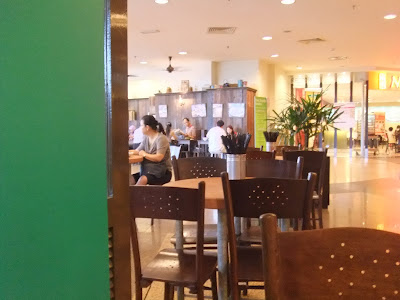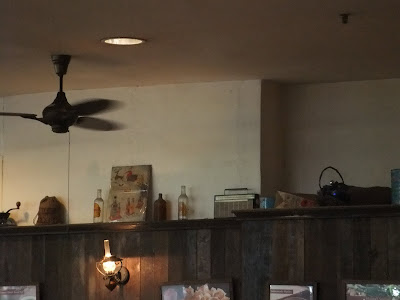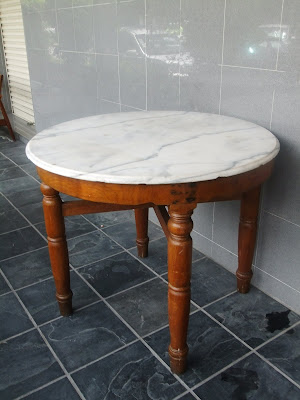Dear All
Those of us from Singapore and Malaysia, must certainly remember those old corner coffee shops in our neighbourhood or small town. "Kopitiam" as we called them. And they are one of our most memorable images of the past, particularly of the 50's, 60's and even the 70's. Recalling kopitiams of the past, evokes a whole paraphernalia of images, sounds and scents.
While we regard them now as relics of the past, then it was a living community, a meeting place for chatting with good old friends over freshly brewed coffee and cigarettes, freshly toast kaya breads and half boiled eggs; a place for simple relaxation to sounds that come from an old transistor radio or images from black and white TV perched on wooden shelf, a place to pick up gossips and to talk politics and an escape from nagging wives.
In old local comedies, a typical scene was that of a wife with folded sleeves, looking for her husband who hanged too long at kopitiam and dragged him home by the ear. It was a male dominated world. Rarely you find ladies hanging around kopitiam then. It was part of the social condition of the times. Women then, were still generally home bound. They have not entered the work force on a mass scale as in the 80's and most meals were still home cooked. Only once a while, they shyly stepped into kopitiams to buy that famous curry puffs, steamed chicken rice, steamed buns or hainese noodles and quickly walked away from teasing eyes.
The most memorable icon of old kopitiam is of course the round kopitiam tables with white marble tops and the kopitiam chairs. The tables came in standard size of 2.5, 3 or 3.5 ft. Sometime, the marbles were square or hexagon in shape. The legs of old kopitiam tables are also varied. The most popular was the one with pedestal legs - one central piece supported by smaller pieces round it. The older prewar versions, it seems , were the 4-legged ones and sometimes with cross bars. Some were made of teak and some from chengal wood.
I'm not sure if the kopitiam tables were made locally or in China by the famous Shanghai craftsmen that once controlled the furniture making business in this region. But one thing is certain, the kopitiam chairs then, came from Poland, bent wood as they are known in Europe. It is interesting to know such early trade existed between us and a far away country like Poland. I'm told that they come much in the same form as Ikea furniture nowadays, disassemble. On arrival, they are assembled and varnished. Interestingly, they were also locally rebranded. If you turn a kopitaim chair upside down, sometimes you see a paper sticker with a cockeral picture on it which was certainly intended as a local brand.
A string of memorable past images comes with the kopitiam apart from the chairs and tables. There were the kopitiam cups and saucers - the charactericstic thick cream coloured cups and saucers with green plant motif on them, the brass coffee makers and tall brass kettles, the white cotton filters for the coffee or tea base, the brightly coloured enamel wares and old thermos, the Diamond brand electric clocks from China, the pictures of alluring Shanghai ladies posters on the walls, the metal advertisement signboards, the old round cigarettes tin containers, the aluminium ashtrays, the tiny glass pepper and soy sauce sets, the tall glass bread cabinets, the glass aerated F & N and Kickapoo bottles, the wooden drink crates, the old grand curved marble or wooden top bar counters and more.
And one can never forget that aromas of freshly grinded coffees and toasted breads, the sweet scents of home made kayas, the constantly sizzling sounds of hot waters, the sound of cracked half boiled eggs, the clanging of old glasses, the thumping sound of wooden drink crates being stacked, the laughs and chatters of regular customers, the cigarette smokes in the air and the cantonese music that came from an old transistor radio. In Malay kampongs, kopitiam even played malay and hindi music!
Because of the strong influence and sentimentalism of kopitiams, they have not completely disappeared. Some authentic kopitiams still remain oblivious to change or happy to coexist in a modern surroundings. New forms of kopitiams have appeared to suit changing times in the form of Ya Kun Toast, Toast Box, White Old Town, Ah Mei Cafe etc. Instead of being in old two storey buildings, which we now regard as conservations houses, they occupied places in shopping malls and arcades. The setting and form may have changed, but the spirit I guess, still linger. Nostalgia of the past is relived in modern settings.
 2 modern-day kopitiams, banking on the sentimentalism of the past, competing for business opposite to each other in a mega mall in Kuala Lumpur. One tries to be more authentic than the other, by using really vintage kopitiam chairs as seen above. These chairs with holes at the back and seat, are also known as Malaccan chairs, made of Chengal wood with metal strips at the base for support. I envy this kopitiam collection. It has around 80pcs of them. And I know they are not reproductions. Must have come down from Penang or Malacca. Their tables, however, is a disappointment. They are not the real kopitiam tables, instead granite top table on metal legs. The other kopitiam across them, uses custom made wooden tables and stools.
2 modern-day kopitiams, banking on the sentimentalism of the past, competing for business opposite to each other in a mega mall in Kuala Lumpur. One tries to be more authentic than the other, by using really vintage kopitiam chairs as seen above. These chairs with holes at the back and seat, are also known as Malaccan chairs, made of Chengal wood with metal strips at the base for support. I envy this kopitiam collection. It has around 80pcs of them. And I know they are not reproductions. Must have come down from Penang or Malacca. Their tables, however, is a disappointment. They are not the real kopitiam tables, instead granite top table on metal legs. The other kopitiam across them, uses custom made wooden tables and stools. A modern day kopitiam trying to capture the spirit of the past, with its collectionsof old F&N glass bottles, old transistor radio, enamel wares etc.
A modern day kopitiam trying to capture the spirit of the past, with its collectionsof old F&N glass bottles, old transistor radio, enamel wares etc.At SECOND CHARM, we do collect kopitiam chairs and tables, and other kopitiam memorabilias. Below are some of them that have passed through our shops or are still available.
 A charming kopitiam table and chairs set, though they are not vintage. Sold to Mr Tan for his indoor garden air well.
A charming kopitiam table and chairs set, though they are not vintage. Sold to Mr Tan for his indoor garden air well. A fully restored kopitiam hexagon shaped table. The original marble has a slight crack on it.Dimension 2.5 ft or 64 cm. Originally, the leg was in orangy lacquer. Available
A fully restored kopitiam hexagon shaped table. The original marble has a slight crack on it.Dimension 2.5 ft or 64 cm. Originally, the leg was in orangy lacquer. Available A vintage 3 ft kopitiam round table with cross bars underneath the marble top. This type of kopitiam table is an earlier piece to the one above, I'm told.
A vintage 3 ft kopitiam round table with cross bars underneath the marble top. This type of kopitiam table is an earlier piece to the one above, I'm told. A relatively new kopitiam rectangle marble top table.
A relatively new kopitiam rectangle marble top table.24 x 30 inches.Several pieces available. Ideal for F&B
 A really dainty kopitiam chairs. Fully restored with
A really dainty kopitiam chairs. Fully restored withnew cane works. 4 pcs. Rare. Personal collections.
 Another unique bent wood chair. Sold to Stefan, a professional
Another unique bent wood chair. Sold to Stefan, a professionalphotographer who took it as is condition inspite of the broken cane.
 Another variation sold to NO BLACK TIE, a popular pub at Bukit Bintang, KL.You must meet the eccentric proprietor, Evelyn, a talented concert pianist turned entrepreneur. We did wooden instead of marble tops for several kopitiam tables that she bought from us when she first started her pub in her newly bought building. Talking about women's power, she is one of them.
Another variation sold to NO BLACK TIE, a popular pub at Bukit Bintang, KL.You must meet the eccentric proprietor, Evelyn, a talented concert pianist turned entrepreneur. We did wooden instead of marble tops for several kopitiam tables that she bought from us when she first started her pub in her newly bought building. Talking about women's power, she is one of them. The classic, authentic kopitiam cups and saucers
The classic, authentic kopitiam cups and saucersLeaving you with a cup of coffee.
Warmest regards
Sharifah
posted on 17 October 2010, 2.30 am
Labels: BENT WOOD FURNITURE, COLONIAL FURNITURE, KOPITIAMS CHAIRS AND TABLES, RETRO 60'S, SECOND CHARM VINTAGE COLLECTIONS, VINTAGE FURNITURE, VINTAGE FURNITURE IN SINGAPORE AND MALAYSIA.
You have read this article with the title KOPI , COFFEE? KOPITIAM - AROMAS, SCENTS AND SOUNDS OF THE PAST. You can bookmark this page URL https://tanyarukaart.blogspot.com/2010/10/kopi-coffee-kopitiam-aromas-scents-and.html. Thanks!
Write by:
Dj Ganden - Minggu, 17 Oktober 2010






































Comments "KOPI , COFFEE? KOPITIAM - AROMAS, SCENTS AND SOUNDS OF THE PAST"
Posting Komentar